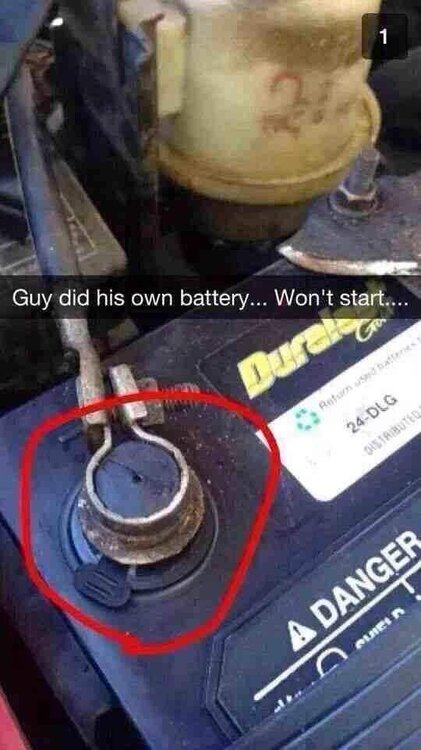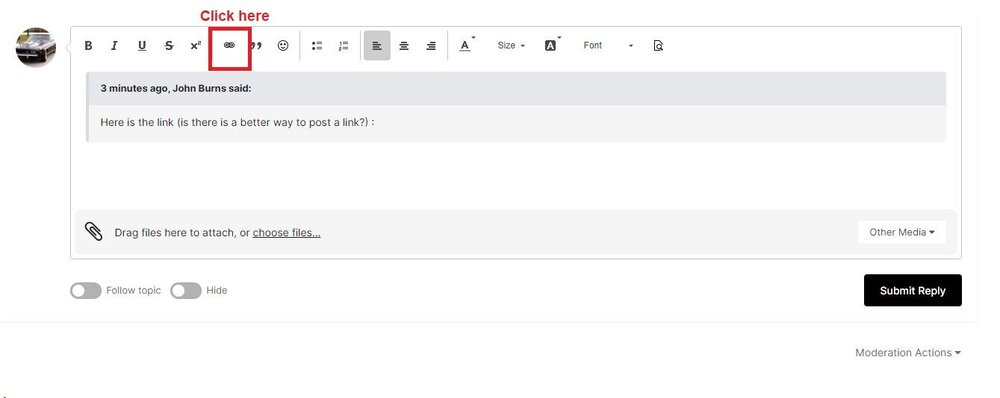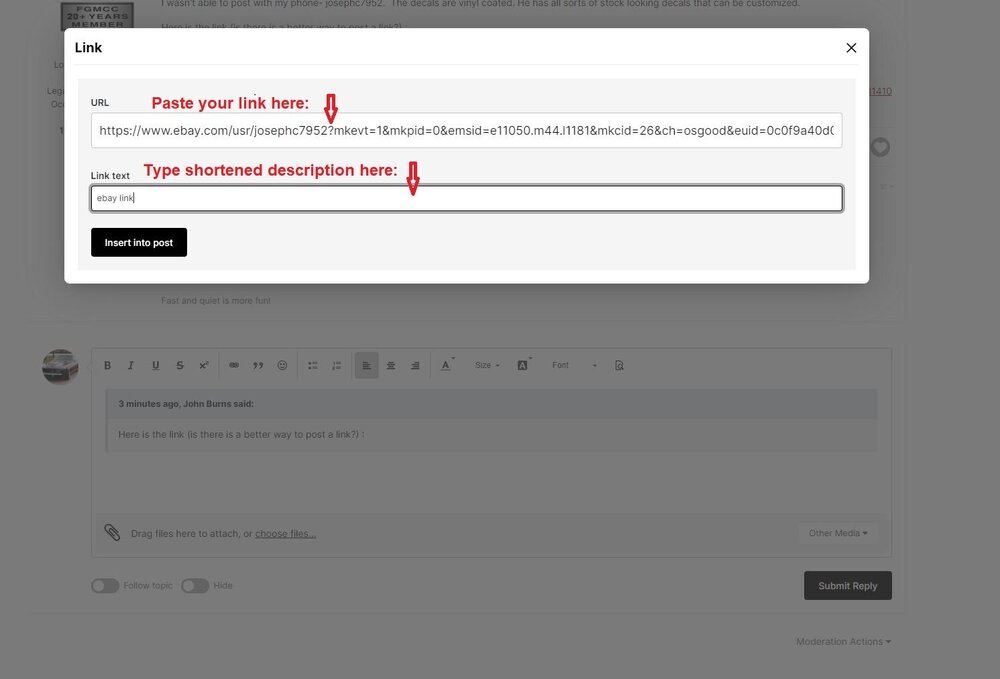-
Posts
3,901 -
Joined
-
Last visited
-
Days Won
178
Content Type
Profiles
Articles
Forums
Gallery
Events
Posts posted by jft69z
-
-
-
Depends on the quality of your 50 year old wires too. If they're internally corroded, that would lead to higher resistance etc.
It wouldn't hurt to increase the wire size as you're considering, but you may be disappointed if the results don't help as much as you're hoping.
-
 1
1
-
-
Is everything else on the car basically stock, no EFI, electric fuel pump, large stereo system, etc?,
Typically it's a 10 gage wire from the factory, with fusible links in there at places, which are usually 4 sizes smaller (resulting in a 14 gage wire, in effect).
-
 1
1
-
-
-
Same here. Before I joined this group, I never entered a show to be judged. To me, it's a $25/year parking space 🤣.
-
 6
6
-
 1
1
-
-
23 minutes ago, 502ci said:
Super Modified?
For some reason that category doesn't ring a bell, is that for the club or was it a option to choose when registering at Carlisle?
Club only, Bill.
Rob gave some details here:
https://www.firstgenmc.com/forums/index.php?/topic/28511-2024-eastern-meet-car-class-registrations/
-
 2
2
-
-
48 minutes ago, 420ponies said:
I use these ones. I don't use the case though.
https://www.amazon.com/LEED-Brakes-
You can get it without the canister for a few bucks less, but usually slower delivery:
https://www.amazon.com/LEED-Brakes-without case
They're actually local to me, but I get them from Amazon, here the next day and I don't have to drive out there (cheaper too).
-
 1
1
-
-
You may need to consider an electronic vacuum pump too. I use the Leeds one on my Monte and Camaro, happy with it so far.
-
 2
2
-
-
13 minutes ago, Dtret said:
I agree. I’ve never been a fan of using additives in anything. Just use the product that’s was designed for that specific purpose. My opinion but I’ve always thought that additives were like an easy way out.
And chemically, the additives may not play nice with what you're adding it to, as a couple of the articles state.
-
 1
1
-
-
15 hours ago, MC1of80 said:
Rotella and wix
Though this isn't the article I was referring to, it has much the same info regarding diesel oil, and also standalone zinc additives as well. Keep in mind, these are oil company experts answering the questions. The link, and a few pertinent excerpts:
https://classicmotorsports.com/articles/ask-oil-expert-industry-specialists-set-record-str/
EDIT: This may be the article I was thinking about, but I know there is one more out there regarding 'break-in' oils, and they also address diesel oil and standalone additives, but it's not in web form yet.(Hemmings Muscle Machines-January 2024 edition):
https://www.motortrend.com/how-to/diesel-oil-in-gasoline-engine/
Q. A lot of people recommend diesel oils for older gasoline engines. Is this good advice? Why or why not?
- A. The diesel oil recommendation most likely started when API reduced the amount of zinc in gasoline engine oils. Diesel oils contain higher amounts of zinc, so this is why people use them in gasoline engines.
Another potential factor is the wider viscosity selection of diesel oils. If your classic requires a 15W-40 oil, for example, it’s going to be hard to find a gasoline engine oil in that viscosity.
Diesel-specific engine oils are designed to help remove the soot and other byproducts of running diesel fuel–a greater amount than gasoline produces. Therefore, diesel oils usually contain a higher concentration of certain detergents to clean the internals better. Usually this is a good thing. However, the detergents can be so effective that they remove part of the oil film from the cylinder walls, and that can mean quicker wear.
There are other reasons why people use diesel oils in gasoline engines, but none of them are, in my opinion, valid. Modern, high-quality gasoline engine oils are much better at protecting the engine than any diesel oil will ever be.
STEFAN BRAUN
Application specialist
Liqui Moly- A. That diesel recommendation comes from the days when diesel oils contained more ZDDP than gasoline engine oils. Today’s API CK-4 diesel spec allows oils to be the same ZDDP level as a gasoline car oil, so the “advantage” of diesel oils has been eliminated.
LAKE SPEED JR.
Certified lubrication specialist
Driven Racing OilQ. Which is better for my original, older engine and why: conventional oil or synthetic? And which one leaks less? And what if that older engine has been recently rebuilt?
- A. As long as your engine is mechanically sound, a motor oil isn’t going to cause leaks–whether it’s conventional or synthetic. If it’s leak-free and in good shape, use a synthetic oil to provide maximum protection. The same goes for healthy rebuilt engines.
If your engine is older and does leak, the problem could be seals and gaskets that have become brittle or worn. Even if the engine doesn’t leak, those seals could still be in poor condition. Sometimes sludge builds up enough to effectively prevent oil from slipping past deteriorated seals or gaskets.
Using a high-quality synthetic oil with good detergency can dissolve that sludge and reveal the true condition of the seals, causing leaks. If you suspect your engine falls into this category, we recommend sticking with a conventional oil.
LEN GROOM
Technical product manager
Amsoil- A. In most cases, classic engines that have been using conventional oil for several years should stay with conventional oil. The seals get accustomed to the lubricant, and big changes (like switching from conventional to synthetic) can cause them to leak. For rarely driven cars, the risk is not worth the reward, so just stick with conventional oil. Now, if the engine is getting rebuilt, then you can go with synthetic (and then stay with synthetic) after the breaking-in process.
LAKE SPEED JR.
Certified lubrication specialist
Driven Racing OilQ. How much zinc does my older engine need?
- A. It depends on the engine’s make, model and vintage as well as its purpose–is it for racing or just the occasional trip around town?
Modern engine oils are formulated to be backward-compatible with older stock gasoline engines. However, plenty of modified older engines are out there with flat tappets and aggressive performance cams. For these souped-up old-timers, a higher-zinc oil (like some racing oils) might be prudent. Defer to OEM recommendations for stock engines and to the engine builder’s recommendations for modified engines.
VALVOLINE TECHNOLOGY TEAM
Compiled by Josh Frederick
OEM technical manager- A. I recommend above 1200 ppm if it has a flat-tappet cam and lifters.
MANUEL A. GUTIÉRREZ
Director of marketing
Lucas OilQ. Do you recommend using a zinc additive in older engines?
- A. Engine oils are a very precise balance of additive components and base oil(s) that work in harmony to provide the desired lubrication. The introduction of any type of additional additive disrupts this formulation synergy–like jamming an extra piece in a puzzle that’s already complete. This change in harmony can have a negative effect on the performance of the oil, not to mention change its identity.
Bottom line: Additional aftermarket additives are not needed. Frankly, if an end user relies on an additive to change some aspect of their oil’s performance, then they’re using the wrong oil.
KENNETH M. TYGER
Director of Technical Services Penn Grade
PennGrade1
Lubricants- A. We never recommend using aftermarket oil additives. Engine oils are designed with a fine balance of base oils and additives designed to work holistically to provide optimal protection and performance. A properly formulated oil for the intended application doesn’t require aftermarket additives to provide good protection. In fact, adding aftermarket additives can disrupt the oil formulation and reduce protection.
LEN GROOM
Technical product manager
Amsoil- A. No! If your oil needs an additive to properly protect your engine, then you need a different oil.
LAKE SPEED JR.
Certified lubrication specialist
Driven Racing Oil-
 4
4
-
23 minutes ago, Paul D Valle said:
Correction: BradPenn 15W40
That's what I use.
-
Very nice!
-
 1
1
-
-
Welcome Zachary, and thank you for becoming a full member, we appreciate it!
-
 1
1
-
-
8 hours ago, Dtret said:
Joe bring your welding equipment. lol. I’ll bring two fenders, the two patches and a gallon of bondo. O ya and a hammer.
22 minutes ago, Michael Boyte said:Include the mandatory adult beverages, and you might just get what you are looking for !!!
Nah...
I considered putting on a metal repair clinic under the club tent, to provide the type of thing that Carlisle said the Fiero people did better than us a couple years ago (poor excuse at best). But, it'll probably be 90o out there, so that's not happening... 🤷♂️
 😄
😄
Plus, it'll cut into my nap time under the tent....
-
 1
1
-
 4
4
-
-
Why don't you pick up the plastic 72 grill too, and bring it to Carlisle, so we can all see what type of quality it is...
-
 1
1
-
-
They only show up on Jegs site, that I can see. The other available ones are completely different (look like junk), with NO holes or stamped relief on the bottom edge.
Maybe it's their own product. If so, good on them for tooling up something with a limited audience/return on investment..
-
 2
2
-
-
1 hour ago, cny first gen 71 said:
I've used frams before, wix, k&n Purolator, napa gold never seen much of a difference but I only put about 1000 miles a year. Last year don't think I did that because I couldn't walk to the car.
K&N, Mobil1, and the original AC Delcos (no longer available) are all good ones, made by Champ labs. The AC Delco, UPF48R line (black, for newer Corvettes, trucks) are still good quality too.
-
 3
3
-
-
-
14 minutes ago, MC1of80 said:
Rotella and wix
I recently read an article about Rotella. Said the diesel oil specs have changed a lot lately and may not be the best for what we do.
-
 1
1
-
-
I use the Mobil 1 (M1-302) filters (Wix are good too), after cutting a bunch of them open.
Any of the Delco's with an 'E' after them ex. PF-48E, are not made as good as they used to be, before FRAM took them over.
The Mobil 1's are still of the same build quality as the original ones made by Champ Labs.
Some pics of various filters:
That being said, not sure about some of the Delco's out there now in the PF35 variety (larger, truck style capacity). I just ordered the ones below and will cut them open.
-
 4
4
-
-
1 hour ago, John Burns said:
Cool! I'm learning
 I fixed my post.
I fixed my post.
I learn new stuff around here all the time 🙂
-
 2
2
-
-
19 minutes ago, John Burns said:
Here is the link (is there is a better way to post a link?) :
There is a way to add your own description to shorten the link posted. Follow the pics below.
Click the "Link" button first:
A new window will pop open, paste the link you want to insert into your post, add the shortened description in the line below, then click "Insert into post" button.
End result:
-
3 minutes ago, Dtret said:
Thanks Glen. Your input is always appreciated and invaluable
We both know he loves you. He just has a hard time with words.
-
 4
4
-
-
It's 23 here, and I got about 3 inches. I'll clear a couple paths and let the rest melt.
-
 2
2
-
 3
3
-








Spark plug wires and plugs
in Non-Tech
Posted
Same here, in the older cars.
Newer vehicles (stock engines), I tend to put the OEM ones back in. Never Bosch plugs, unless you want misfire codes.